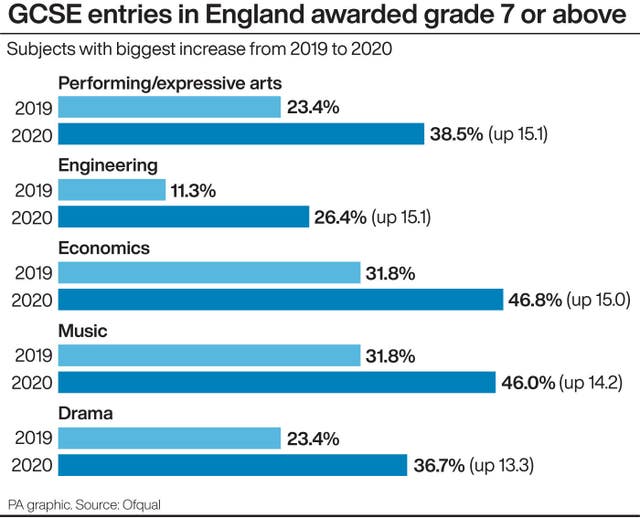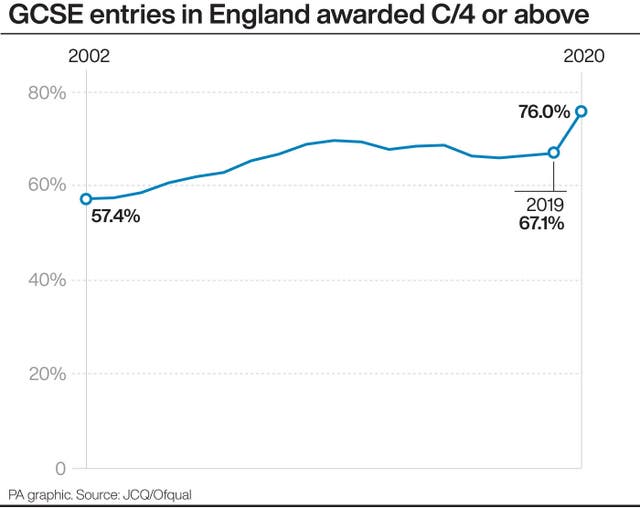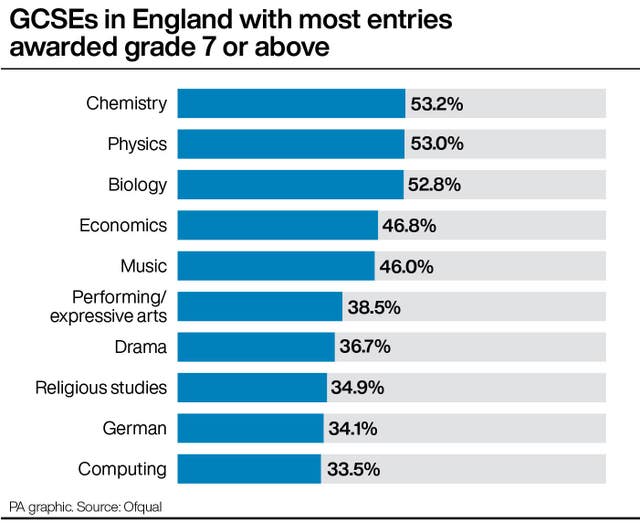GCSE grades surge after U-turn gives pupils results based on teachers’ estimates
More than one in four entries in England scored one of the three top grades this year amid the grading change.

The proportion of GCSE entries in England awarded top grades has surged to a record high after a U-turn meant results could be based on teachers’ estimated grades amid cancelled exams.
Hundreds of thousands of youngsters received their GCSE results on Thursday following major changes – but around 200,000 Btec pupils will not get their final results following a last-minute review of grades.
More than one in four (25.9%) GCSE entries in England scored one of the three top grades this year, up from just over a fifth (20.7%) last summer, figures from exams regulator Ofqual show.
The proportion receiving at least a 7 – the equivalent of an A grade – is a record high based on available data following the decision to award grades based on teachers’ assessments, rather than an algorithm.
Figures from Ofqual show that 6.3% of entries in England were awarded a 9 – the highest grade under the new numerical grading system – this summer compared to 4.5% last year.
More than three in four (76%) entries were awarded at least a 4 – which is broadly the equivalent of a C – in England, which is up 8.9 percentage points on last year when 67.1% achieved the grades.
The proportion of entries gaining 4 or above in the key subject of English rose by 9.4 percentage points to 71.2%. The proportion gaining 7 or above rose from 13.9% to 18.7% this year.
In maths, the proportion gaining 4 or above in maths rose by 7 percentage points to 66.6% – and those securing 7 or above rose from 15.9% to 19%.
It comes after GCSE and A-level students in England, Wales and Northern Ireland were told they would now be awarded the higher of either their teachers’ grade or the moderated grade following an outcry.
Ofqual has confirmed that students in England who are unhappy with GCSE grades awarded by their school or college will not be able to appeal – unless there was an administrative error.

Last week, nearly two in five (39.1%) of the A-level grades submitted by schools and colleges in England – around 280,000 entries in total – were adjusted down after moderation.
But new Ofqual data shows that the proportion of A-level entries now receiving an A grade or higher has increased to a record high for England following the U-turn, with 38.1% awarded the top grades.
When this year’s results were first released last week under the controversial moderation system, some 27.6% of entries achieved an A or above.
Exam boards had moderated the grades – using an algorithm from Ofqual – to ensure this year’s results were not significantly higher than previously and the value of students’ grades was not undermined.
Schools minister Nick Gibb apologised to students on Thursday morning for the “pain and the anxiety” they felt prior to this week’s exam grading U-turn.

Traditional A*-G GCSE grades have been scrapped and replaced in England with a 9-1 system with 9 the highest result. A 4 is broadly equivalent to a C grade, and a 7 broadly equivalent to an A.
Students receiving GCSE results this summer will get numerical grades for all their subjects as all courses have now moved over to the new grading system.
College leaders have said more students than ever are likely to progress to A-levels and vocational courses following steep rises in the GCSE pass rates – including in maths and English.
David Hughes, chief executive of the Association of Colleges, added: “At the same time there may be fewer apprenticeship opportunities for school leavers because of the pressures in the labour market.”
Some colleges are already at maximum capacity and there is a limit to the number of pupils they can admit amid the Covid-19 pandemic, according to the Sixth Form Colleges Association (SFCA).

And yet hundreds of thousands of Btec students are still waiting for their final grades after the exam board told schools and colleges not to release the results to pupils on Thursday.
Btec grades were not included in the original U-turn, but on Wednesday – with just hours to go until results day – examiner Pearson said it would regrade Btecs to “address concerns about unfairness”.
The Government is facing calls from education leaders to increase funding and capacity in colleges and sixth forms to ensure students – including those waiting for Btec results – do not miss out on places amid a rise in top grades.

Mr Gibb said he was hopeful that pupils will get their Btec results next week.
Speaking to BBC Breakfast, he said: “To those hundreds of thousands of young people receiving their GCSE grades and the A-level students receiving recalculated grades, I will say this to them, congratulations on what you have achieved.
“But also how sorry I am for the pain, the anxiety and the uncertainty that they will have suffered as a consequence of the grading issues we encountered last week.”
Speaking on GCSE results day, Geoff Barton, general secretary of the Association of School and College Leaders (ASCL), said: “The profession rose to the challenge admirably.
“It was events beyond our control that sunk the standardisation model. Schools and colleges have once again been left to clear up the mess.”




